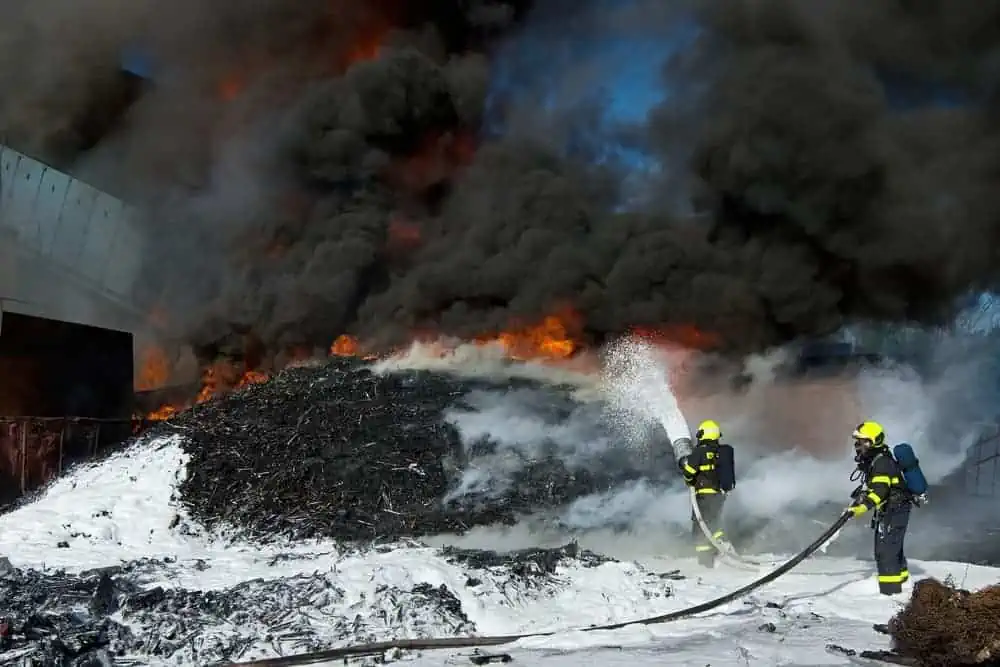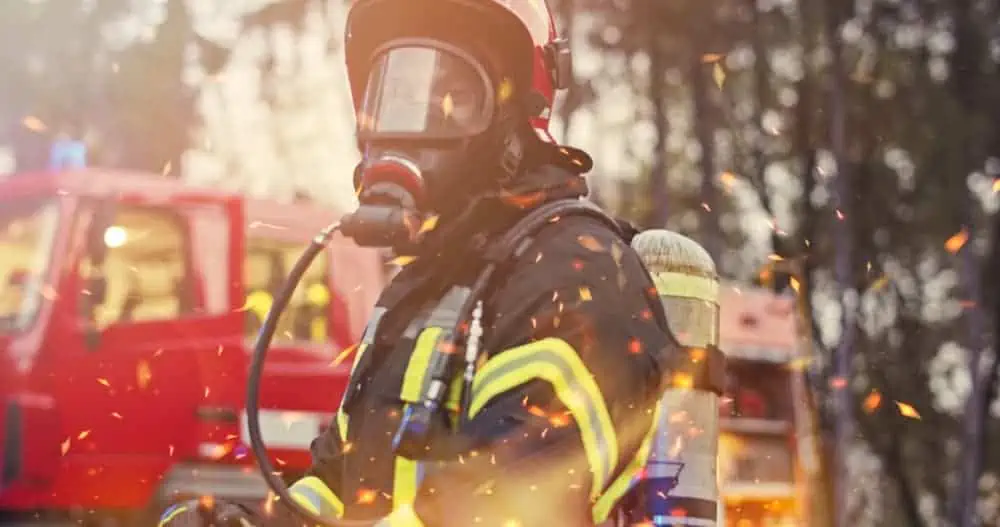What Firefighting Foam Has PFAS?
- Last Updated: August 3rd, 2023

Attorney Jessica Paluch-Hoerman, founder of TruLaw, has over 28 years of experience as a personal injury and mass tort attorney, and previously worked as an international tax attorney at Deloitte. Jessie collaborates with attorneys nationwide — enabling her to share reliable, up-to-date legal information with our readers.
Legally Reviewed
This article has been written and reviewed for legal accuracy and clarity by the team of writers and legal experts at TruLaw and is as accurate as possible. This content should not be taken as legal advice from an attorney. If you would like to learn more about our owner and experienced injury lawyer, Jessie Paluch, you can do so here.
Fact-Checked
TruLaw does everything possible to make sure the information in this article is up to date and accurate. If you need specific legal advice about your case, contact us by using the chat on the bottom of this page. This article should not be taken as advice from an attorney.
What Firefighting Foam Has PFAS?
Per- and polyfluoroalkyl substances (PFAS) are a class of chemicals with a wide array of uses in industry and in consumer products.
They are considered incredibly useful and have been mass-produced since the 1940s because of their unique ability to repel both water and oil.
As a result, these chemicals can be found in everyday products such as several types of food packaging, cosmetics, shampoos, stain-resistant fabrics, and nonstick cookware.
Of particular note to both firefighters and the general population is the presence of PFAS chemicals in certain firefighting foams.

There is an increasing concern about PFAS chemicals in these foams and in other products because they have an almost unlimited persistence in the environment.
In fact, many people refer to PFAS as “forever chemicals” due to their virtually unlimited resistance to breakdown in the environment.
Table of Contents
PFAS and Human Health
This concern is magnified by the fact that research has linked exposure to PFAS chemicals in general, and to firefighting foams in particular, with a number of human health risks.
According to the Centers for Disease Control (CDC), these concerns include:
- Heightened cholesterol
- Liver damage
- Pregnancy risks
- Birth defects
- Increased risk of kidney and testicular cancer
In addition to workers who produce PFAS and PFAS-containing products, there is evidence that firefighters are among the groups that are at particular risk for developing these health concerns as a result of exposure to the chemicals including through skin absorption.
PFAS and Aqueous Film-Forming Foam
Firefighters have used aqueous film-forming foam (AFFF) for decades in their efforts to extinguish fires that are particularly difficult to suppress.
Because it is made with water- and oil-repellent PFAS, AFFF has proven especially useful in fires that involve petroleum products or other flammable liquids.
However, recent research has indicated that AFFF use has had grave consequences for the firefighters who work with it and for the communities they work to protect.
Environmental Impact of AFFF
One of the main concerns is the negative environmental impact of AFFF discharge.
When these foams are used consistently over long periods of time, as they are in fire training facilities, PFAS chemicals have the potential to accumulate in the soil, and from there, they can get into the groundwater.
As reported by the Environment Working Group (EWG), one such study by the United States Environmental Protection Agency (EPA) collected data on nearly 900 releases of AFFF into the environment.
Many of these releases occurred in local waterways, creating dangerous levels of contamination in drinking water and the fish populations that live in them.
Increased Risk for the Health of Firefighters
 According to the International Pollutants Elimination Network (IPEN), current research has shown “unequivocal evidence” that firefighters who used AFFF have “unacceptably elevated” levels of PFAS in their blood.
According to the International Pollutants Elimination Network (IPEN), current research has shown “unequivocal evidence” that firefighters who used AFFF have “unacceptably elevated” levels of PFAS in their blood.
Firefighters’ increased risk of exposure comes from sources such as:
- Use of AFFF in firefighting operations and training
- Contact with contaminated personal protective equipment (PPE)
- Handling contaminated equipment
- Managing PFAS foam wastes
- Living and working in contaminated fire stations
What Are Governments Doing to Manage Risks from AFFF?
The EWG notes that there are alternatives to AFFF that are both safer and equally effective.
Because of this, several states have prohibited (or are in the process of prohibiting) AFFF and other foams that are made with PFAS.
On the federal level, Congress recently passed legislation requiring federal work safety experts to certify PFAS-free firefighting gear.
Furthermore, the Department of Defense has ordered all its fire departments to stop using PFAS-based foams by 2024.
What Should Fire Departments Do If They Still Use AFFF?
While the Fire Department Safety Officers Association recommends that all fire departments switch to alternatives that do not contain PFAS, there are no federal regulations in place for fire departments outside of the Department of Defense.
The following guidelines can help fire departments mitigate the environmental and health risks of AFFF:
- Avoid disposing of AFFF in storm drains, sewers, and landfills
- Do not sell or give AFFF to other departments
- Do not send AFFF for use at training sites or fire academies
- Evaluate your department’s standard operating procedure for foams
- Store AFFF safely for pick-up and proper disposal
Protecting Firefighters and Communities
Researchers and the general public are still learning about the environmental and health risks of PFAS and AFFF.
The more governments and fire departments can educate and inform firefighters and the people in affected communities about the changes that are being made, as well as the shifts that still need to occur, the more prepared everyone can be to keep themselves and their surroundings safe.
TruLaw works with experienced lawyers who are prepared to fight on behalf of individuals harmed by drugs, devices, chemicals and other products.
To determine if you may be eligible for a Firefighting gear case, visit our Firefighter Gear Instant Case Evaluator today.

Managing Attorney & Owner
With over 25 years of legal experience, Jessica Paluch-Hoerman is an Illinois lawyer, a CPA, and a mother of three. She spent the first decade of her career working as an international tax attorney at Deloitte.
In 2009, Jessie co-founded her own law firm with her husband – which has scaled to over 30 employees since its conception.
In 2016, Jessie founded TruLaw, which allows her to collaborate with attorneys and legal experts across the United States on a daily basis. This hypervaluable network of experts is what enables her to share the most reliable, accurate, and up-to-date legal information with our readers!
Here, at TruLaw, we’re committed to helping victims get the justice they deserve.
Alongside our partner law firms, we have successfully collected over $3 Billion in verdicts and settlements on behalf of injured individuals.
Would you like our help?
At TruLaw, we fiercely combat corporations that endanger individuals’ well-being. If you’ve suffered injuries and believe these well-funded entities should be held accountable, we’re here for you.
With TruLaw, you gain access to successful and seasoned lawyers who maximize your chances of success. Our lawyers invest in you—they do not receive a dime until your lawsuit reaches a successful resolution!
AFFF Lawsuit claims are being filed against manufacturers of aqueous film-forming foam (AFFF), commonly used in firefighting.
Claims allege that companies such as 3M, DuPont, and Tyco Fire Products failed to adequately warn users about the potential dangers of AFFF exposure — including increased risks of various cancers and diseases.
Depo Provera Lawsuit claims are being filed by individuals who allege they developed meningioma (a type of brain tumor) after receiving Depo-Provera birth control injections.
A 2024 study found that women using Depo-Provera for at least 1 year are five times more likely to develop meningioma brain tumors compared to those not using the drug.
Suboxone Tooth Decay Lawsuit claims are being filed against Indivior, the manufacturer of Suboxone, a medication used to treat opioid addiction.
Claims allege that Indivior failed to adequately warn users about the potential dangers of severe tooth decay and dental injuries associated with Suboxone’s sublingual film version.
Social Media Harm Lawsuits are being filed against social media companies for allegedly causing mental health issues in children and teens.
Claims allege that companies like Meta, Google, ByteDance, and Snap designed addictive platforms that led to anxiety, depression, and other mental health issues without adequately warning users or parents.
Transvaginal Mesh Lawsuits are being filed against manufacturers of transvaginal mesh products used to treat pelvic organ prolapse (POP) and stress urinary incontinence (SUI).
Claims allege that companies like Ethicon, C.R. Bard, and Boston Scientific failed to adequately warn about potential dangers — including erosion, pain, and infection.
Bair Hugger Warming Blanket Lawsuits involve claims against 3M — alleging their surgical warming blankets caused severe infections and complications (particularly in hip and knee replacement surgeries).
Plaintiffs claim 3M failed to warn about potential risks — despite knowing about increased risk of deep joint infections since 2011.
Baby Formula NEC Lawsuit claims are being filed against manufacturers of cow’s milk-based baby formula products.
Claims allege that companies like Abbott Laboratories (Similac) and Mead Johnson & Company (Enfamil) failed to warn about the increased risk of necrotizing enterocolitis (NEC) in premature infants.
Here, at TruLaw, we’re committed to helping victims get the justice they deserve.
Alongside our partner law firms, we have successfully collected over $3 Billion in verdicts and settlements on behalf of injured individuals.
Would you like our help?








